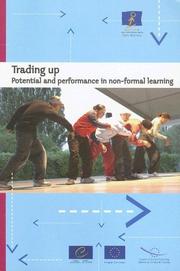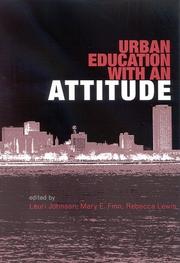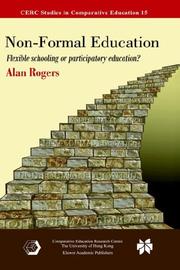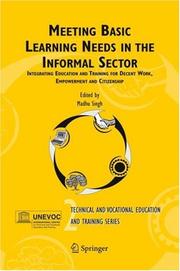| Listing 1 - 5 of 5 |
Sort by
|

ISBN: 9287157650 9789287157652 Year: 2005 Publisher: Strasbourg: Council of Europe,
Abstract | Keywords | Export | Availability | Bookmark
 Loading...
Loading...Choose an application
- Reference Manager
- EndNote
- RefWorks (Direct export to RefWorks)
Understanding, explicating, recognising and evaluating the quality of non-formal learning in the youth sector are questions for wich researchers, policymakers and those working with young people are now trying to find answers. Developing productive relations between non-formal learning in schooling, higher, continuing and vocational education and employment is a more recent concern. The European Commission and Council of Europe Partnership Programme on Youth Research 2003-2005 held a seminar in April 2004 to debate these issues, starting with the view that learning is important wherever it takes place, in so far as it contributes towards fostering personal development, active citizenship, employability and social inclusion.
Non-formal education --- Education --- Experimental methods --- Sociale agogiek --- jeugdwerk- en beleid --- jeugdwerk- en beleid. --- Non-formal education - Europe --- Education - Experimental methods - Europe
Book
ISBN: 9289602759 9789289602754 Year: 2005 Volume: 117 Publisher: Luxembourg: Office for official publications of the European Communities,
Abstract | Keywords | Export | Availability | Bookmark
 Loading...
Loading...Choose an application
- Reference Manager
- EndNote
- RefWorks (Direct export to RefWorks)
Adult education. Lifelong learning --- European Union --- Non-formal education --- Educational tests and measurements --- Continuing education --- Education non formelle --- Tests et mesures en éducation --- Education permanente --- Evaluation. --- Non-formal education - European Union countries. --- Non-formal education - European Union countries - Evaluation. --- Educational tests and measurements - European Union countries. --- Continuing education - European Union countries.

ISBN: 0791483584 142374389X 9781423743897 079146380X 9780791463802 0791463796 9780791463796 9780791483589 Year: 2005 Publisher: Albany : State University of New York Press,
Abstract | Keywords | Export | Availability | Bookmark
 Loading...
Loading...Choose an application
- Reference Manager
- EndNote
- RefWorks (Direct export to RefWorks)
Teachers, community activists, and parents acknowledge and applaud democratic educational systems that establish partnerships between universities and the urban communities they serve.
Curriculum change --- Teachers --- Popular education --- Community education --- Education, Urban --- Curriculum reform --- Instructional change --- Reform, Curriculum --- Curriculum planning --- Education --- Critical theory --- Non-formal education --- Critical pedagogy --- Education, Community --- Training of --- Curricula

ISBN: 1280804270 9786610804276 0387286934 0387246363 1441937579 Year: 2005 Volume: 15 Publisher: Hong Kong : New York : Comparative Education Research Centre, University of Hong Kong ; Kluwer Academic,
Abstract | Keywords | Export | Availability | Bookmark
 Loading...
Loading...Choose an application
- Reference Manager
- EndNote
- RefWorks (Direct export to RefWorks)
This is the first full study of non-formal education on an international scale since the 1980s. The book describes the emergence of the concept in the context of development and educational reform. It traces the debate about non-formal education from its origins in 1968 to the mid 1980s, and looks at the issues that this debate raised. It then describes a number of programmes in different parts of the world which call themselves ‘non-formal’, pointing out the wide range of different views about what is and what is not non-formal. Rogers asks whether we should drop the term altogether or try to reconceptualise it in terms of flexible schooling or participatory education. This is an important new book by a well-established author. It deals with complex issues, but is written in a clear style. It contains an important new analysis of the development paradigms in which the controversies surrounding non-formal education grew up, and which shaped its purpose and impacts. The author’s call for a reformulation of the concept will find echoes not only in developing societies, but also in Western circles, where the language of non-formal education is being used increasingly within the context of lifelong learning. The book grew out of the teaching of non-formal education in which Professor Rogers has been engaged for the last 20 years. It is intended for teachers and students in comparative education courses in higher education institutions, and for researchers and others with an interest in the field.
Non-formal education. --- Education. --- Children --- Education, Primitive --- Education of children --- Human resource development --- Instruction --- Pedagogy --- Schooling --- Students --- Youth --- Civilization --- Learning and scholarship --- Mental discipline --- Schools --- Teaching --- Training --- Informal education --- Informal learning --- Nonformal education --- Adult education --- Educational innovations --- Occupational training --- Gap years --- Prior learning --- Education --- Administration, Organization and Leadership. --- Educational Policy and Politics. --- School management and organization. --- School administration. --- Educational policy. --- Education and state. --- Education policy --- Educational policy --- State and education --- Social policy --- Endowment of research --- Administration, Educational --- Educational administration --- Inspection of schools --- Operation policies, School --- Policies, School operation --- School administration --- School inspection --- School operation policies --- School organization --- Management --- Organization --- Government policy --- Inspection --- Management and organization --- Educació no-formal --- Educació alternativa --- Educació extraescolar --- Educació informal --- Educació no-reglada --- Ensenyament no-reglat --- Educació popular --- Formació ocupacional --- Educació d'adults --- Colònies escolars --- Escoles alternatives --- Innovacions educatives --- Mètodes educatius

ISBN: 1280283858 9786610283859 140203427X 1402034261 9048168627 Year: 2005 Volume: v. 2 Publisher: Dordrecht, The Netherlands : Springer,
Abstract | Keywords | Export | Availability | Bookmark
 Loading...
Loading...Choose an application
- Reference Manager
- EndNote
- RefWorks (Direct export to RefWorks)
"This anthology brings together basic facts and features about basic learning needs and skills of people working and living in the informal economy and presents case studies from different countries examining educational and training strategies for meeting these learning needs. It portrays the grave problems facing educational and training systems vis-á-vis informal sector workers, even as they look at holistic solutions that take into account principles of lifelong learning and innovations in informal, non-formal and formal adult learning, and show a growing awareness that education is a human right of fundamental significance to promoting decent work and humane living conditions. The size, diversity, and the strength and sheer tenacity of workers and owners in the informal sector as well as the stress on globalisation and technological changes have combined to bring about a reappraisal of the links between education and training and the informal labour market. The book looks at the interlinkages between EFA and work and takes the stance that promoting the right to basic education is crucial for overcoming oppression and indecent working conditions. Basic education in its current state is not imparting the necessary skills for entry to the labour market. In view of this gap, the case studies pose the crucial question of what essential skills and which basic learning needs have to be addressed for productive and decent work.
Non-formal education. --- Adult education. --- Informal sector (Economics) --- Fundamental education. --- Employees --- Training of. --- Community development --- Education --- Hidden economy --- Parallel economy --- Second economy --- Shadow economy --- Subterranean economy --- Underground economy --- Artisans --- Economics --- Small business --- Adults, Education of --- Education of adults --- Continuing education --- Open learning --- Informal education --- Informal learning --- Nonformal education --- Adult education --- Educational innovations --- Occupational training --- Gap years --- Prior learning --- Professional & Vocational Education. --- Sociology of Education. --- Education, general. --- Educational Policy and Politics. --- Professional education. --- Vocational education. --- Educational sociology. --- Education. --- Educational policy. --- Education and state. --- Education policy --- Educational policy --- State and education --- Social policy --- Endowment of research --- Children --- Education, Primitive --- Education of children --- Human resource development --- Instruction --- Pedagogy --- Schooling --- Students --- Youth --- Civilization --- Learning and scholarship --- Mental discipline --- Schools --- Teaching --- Training --- Education and sociology --- Social problems in education --- Society and education --- Sociology, Educational --- Sociology --- Education, Vocational --- Vocational training --- Work experience --- Technical education --- Education, Professional --- Career education --- Education, Higher --- Government policy --- Aims and objectives
| Listing 1 - 5 of 5 |
Sort by
|

 Search
Search Feedback
Feedback About UniCat
About UniCat  Help
Help News
News